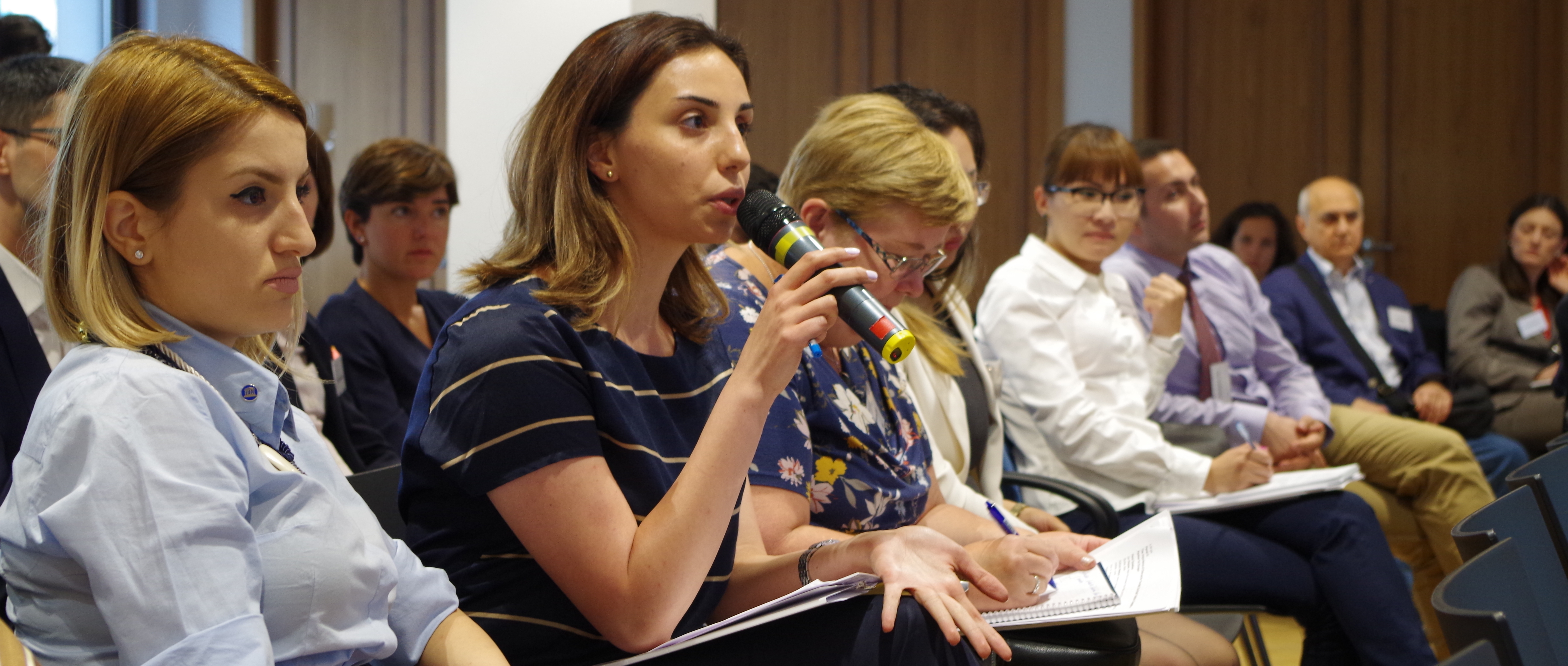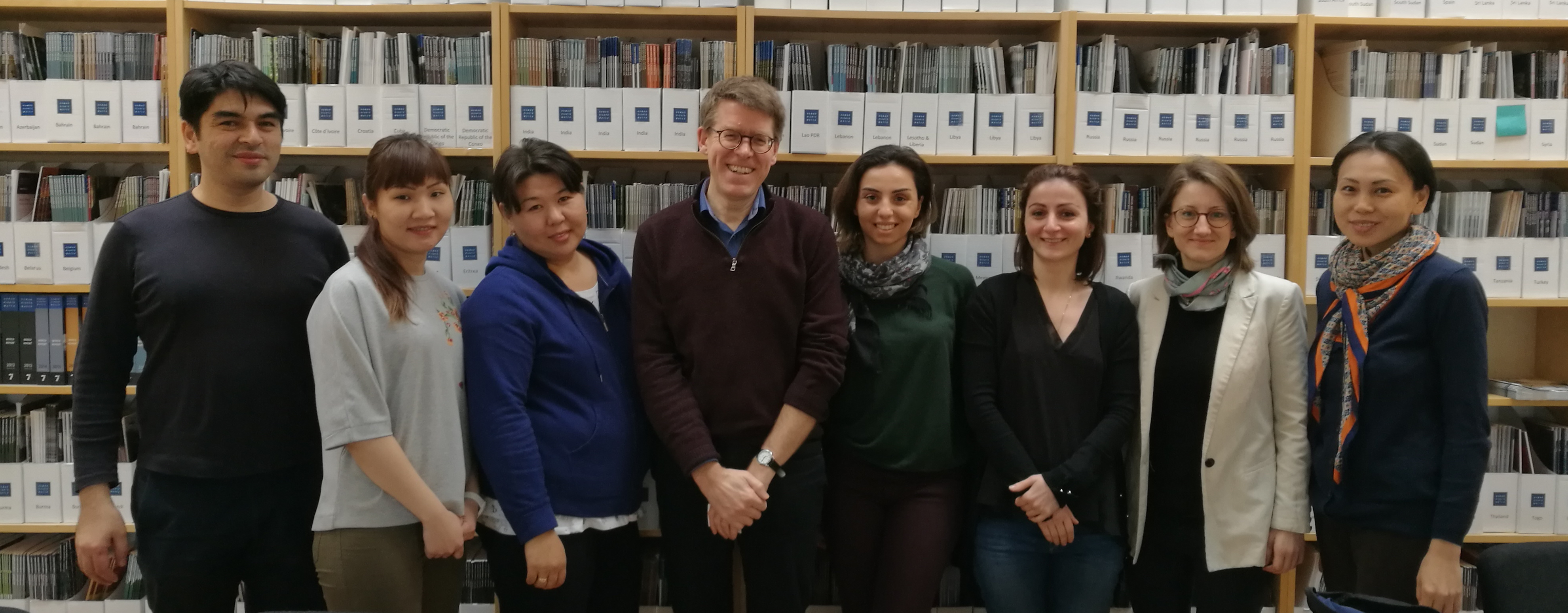
Programme Structure
The duration of the EUCACIS PhD support programme is 3 years, beginning in autumn 2016. In the course of the programme, participants will write their doctoral theses and at least one policy or research paper.
Furthermore, the EUCACIS fellows participate in:
Overview of the programme



Online Courses and Coaching
In order to guarantee continuous supervision and to provide relevant input during the course of the three-year EUCACIS programme, a wide range of learning and communication tools will be available on the platform ILIAS. Firstly, online courses in Methodology of Political Science, Methodology of Economics, Comparative Regionalism and others will be offered. These courses will especially focus on the policy and research papers that the PhD fellows will have to compose during their participation at EUCACIS. Secondly, ILIAS will offer room for exchange with lecturers and other PhD fellows within online fora, where group debates can take place. Thirdly, a “black board“ will provide information on new publications, useful websites and significant upcoming events in the sphere of International Relations.
Alongside the support offered at ILIAS, individually attributed mentors will continuously accompany the PhD fellows throughout their doctorate and provide career-related advice. Furthermore, the EUCACIS project team will be available for personal and Skype-based consultations in order to discuss organisational matters as well as to give advice on the consolidation of the input provided during the PhD Schools and the Research Training Stays.

Conferences

The four international conferences are designed to discuss different topics related to the programme focus with senior and junior researchers, renowned experts and officials from the target region, Europe and other regions. Also the EUCACIS fellows present their research findings of their doctoral project and different versions of their research or policy paper to discuss them with invited commentators.
During the panel discussions and the projects presentations the fellows receive new impulses and feedback for their own research and have the opportunity to train their presentation skills. Furthermore, they take the floor in sessions for junior researchers to comment on their peers’ presentations and have the opportunity to establish new contacts with other conference participants.
The opening conference of the programme took place in Almaty on 30 and 31 August 2016. In July 2017, the second international EUCACIS conference with a focus on geopolitical change in Central Asia and the Southern Caucasus and the future role of Europe in that region took place. The third EUCACIS conference on "Central Asia and the South Caucasus in Transition: International Perspectives" took place in Tbilisi, Georgia, in August 2018. The last conference on "the EU, Central Asia and the South Caucasus: New Approaches on Regional and International Cooperation" was held in Bishkek, Kyrgyzstan on 23-24 May 2019.

PhD Schools

Three PhD schools of up to one week allow for intensive coaching of the EUCACIS fellows in seminars, exercises, discussion rounds, colloquia and individual consultation hours. They aim at guiding the fellows through the whole process of writing a doctoral thesis and a research or policy paper as well as training them in additional academic “soft-skills”.
Lectures and exercises in methodology of political science/international relations, contemporary history and economics as well as on different quantitative and qualitative methods are of great importance. Additional lectures cover theoretical approaches of the covered academic disciplines, and seminars are foreseen on how to prepare and write scientific texts. Exercises and group work provide guidance through the whole process, from preparing a research plan to writing a doctoral thesis and a policy or research paper, including the techniques for finding appropriate literature and documents, and the use of the appropriate methodological approaches. Regular intensive discussions of the doctoral projects and exercises on making presentations and preparing for interventions at conferences are scheduled. These in-class offers are complemented by individual consultation hours to discuss the fellows’ working-plans and individual progress in writing the thesis and the papers.
The publication of the research and policy papers in the framework of the programme is prepared during the PhD schools. Notably, the EUCACIS fellows receive information on how to publish in international peer-reviewed journals, and they are supported during the revise and submission process. Funding possibilities for projects, processing of project applications and project management as well as teaching undergraduate courses are also trained.
The first EUCACIS PhD school took place in July 2017 in Berlin, the second - in February 2018 in Berlin, too. The third EUCACIS PhD school was held in August 2018 in Tbilisi. The fourth and the last PhD school will take place in February 2020 in Istanbul.

Research training Stays

Each fellow participates in one research training stay of three weeks which is dedicated to intensive training and working on the policy/research papers under direct supervision of the EUCACIS team in Berlin. They may also use the stay to conduct interviews in Berlin or other European capitals (through short research trips) in relation to their doctoral thesis or their research/policy paper.
During the research training stay, the EUCACIS participants have their own desks in Berlin for individual research and access to Berlin libraries. Following individual working schedules under close supervision it is the objective to advance the policy/research paper as far as possible during the three weeks in Berlin and to agree on further working plan until finalizing the paper. Weekly colloquiums provide the forum to discuss issues of common concern, such as theoretical or methodological questions. Depending on the fellows’ research interests, guest speakers are invited and visits to Berlin-based (research) institutions are organized.